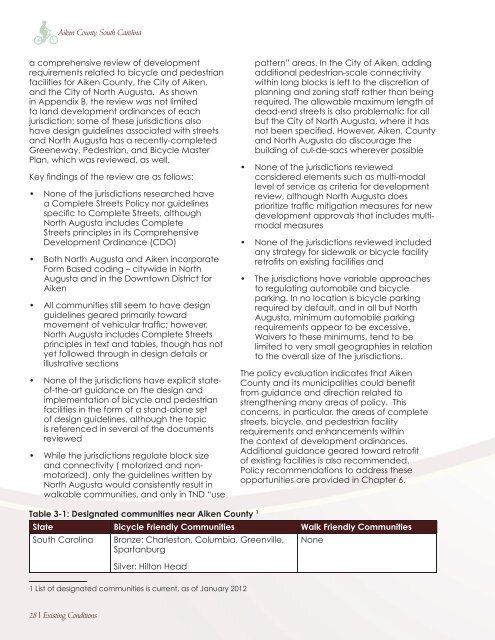Chapter 3: Existing Conditions - Augusta, Georgia
Chapter 3: Existing Conditions - Augusta, Georgia
Chapter 3: Existing Conditions - Augusta, Georgia
Create successful ePaper yourself
Turn your PDF publications into a flip-book with our unique Google optimized e-Paper software.
Aiken County, South Carolina<br />
a comprehensive review of development<br />
requirements related to bicycle and pedestrian<br />
facilities for Aiken County, the City of Aiken,<br />
and the City of North <strong>Augusta</strong>. As shown<br />
in Appendix B, the review was not limited<br />
to land development ordinances of each<br />
jurisdiction; some of these jurisdictions also<br />
have design guidelines associated with streets<br />
and North <strong>Augusta</strong> has a recently-completed<br />
Greeneway, Pedestrian, and Bicycle Master<br />
Plan, which was reviewed, as well.<br />
Key findings of the review are as follows:<br />
• None of the jurisdictions researched have<br />
a Complete Streets Policy nor guidelines<br />
specific to Complete Streets, although<br />
North <strong>Augusta</strong> includes Complete<br />
Streets principles in its Comprehensive<br />
Development Ordinance (CDO)<br />
• Both North <strong>Augusta</strong> and Aiken incorporate<br />
Form Based coding – citywide in North<br />
<strong>Augusta</strong> and in the Downtown District for<br />
Aiken<br />
• All communities still seem to have design<br />
guidelines geared primarily toward<br />
movement of vehicular traffic; however,<br />
North <strong>Augusta</strong> includes Complete Streets<br />
principles in text and tables, though has not<br />
yet followed through in design details or<br />
illustrative sections<br />
• None of the jurisdictions have explicit stateof-the-art<br />
guidance on the design and<br />
implementation of bicycle and pedestrian<br />
facilities in the form of a stand-alone set<br />
of design guidelines, although the topic<br />
is referenced in several of the documents<br />
reviewed<br />
• While the jurisdictions regulate block size<br />
and connectivity ( motorized and nonmotorized),<br />
only the guidelines written by<br />
North <strong>Augusta</strong> would consistently result in<br />
walkable communities, and only in TND “use<br />
28 | <strong>Existing</strong> <strong>Conditions</strong><br />
pattern” areas. In the City of Aiken, adding<br />
additional pedestrian-scale connectivity<br />
within long blocks is left to the discretion of<br />
planning and zoning staff rather than being<br />
required. The allowable maximum length of<br />
dead-end streets is also problematic for all<br />
but the City of North <strong>Augusta</strong>, where it has<br />
not been specified. However, Aiken, County<br />
and North <strong>Augusta</strong> do discourage the<br />
building of cul-de-sacs wherever possible<br />
• None of the jurisdictions reviewed<br />
considered elements such as multi-modal<br />
level of service as criteria for development<br />
review, although North <strong>Augusta</strong> does<br />
prioritize traffic mitigation measures for new<br />
development approvals that includes multimodal<br />
measures<br />
• None of the jurisdictions reviewed included<br />
any strategy for sidewalk or bicycle facility<br />
retrofits on existing facilities and<br />
• The jurisdictions have variable approaches<br />
to regulating automobile and bicycle<br />
parking. In no location is bicycle parking<br />
required by default, and in all but North<br />
<strong>Augusta</strong>, minimum automobile parking<br />
requirements appear to be excessive.<br />
Waivers to these minimums, tend to be<br />
limited to very small geographies in relation<br />
to the overall size of the jurisdictions.<br />
The policy evaluation indicates that Aiken<br />
County and its municipalities could benefit<br />
from guidance and direction related to<br />
strengthening many areas of policy. This<br />
concerns, in particular, the areas of complete<br />
streets, bicycle, and pedestrian facility<br />
requirements and enhancements within<br />
the context of development ordinances.<br />
Additional guidance geared toward retrofit<br />
of existing facilities is also recommended.<br />
Policy recommendations to address these<br />
opportunities are provided in <strong>Chapter</strong> 6.<br />
Table 3-1: Designated communities near Aiken County 1<br />
State Bicycle Friendly Communities Walk Friendly Communities<br />
South Carolina Bronze: Charleston, Columbia, Greenville,<br />
Spartanburg<br />
None<br />
Silver: Hilton Head<br />
1 List of designated communities is current, as of January 2012


